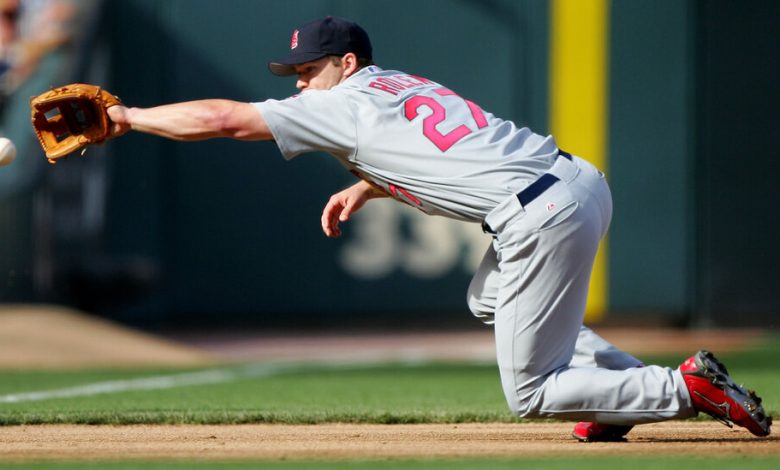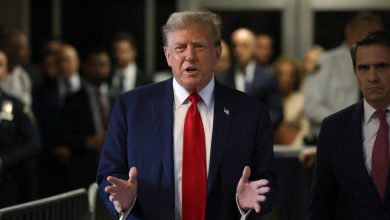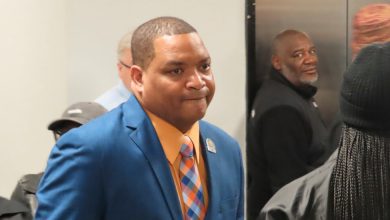On the Hall of Fame Ballot, ‘None of the Above’ Could Prevail

None of the candidates on the Baseball Hall of Fame ballot would have made a case like this. So leave it to Montgomery Brewster — a washed-up but wealthy pitcher for the fictional Hackensack Bulls — to summarize the message some voters took from the names up for enshrinement this week.
“Write in ‘none of the above’ on your ballot,” commanded Richard Pryor, running for mayor of New York as the title character in “Brewster’s Millions,” the 1985 comedy. “Don’t vote for any of us!”
When the Hall of Fame announces the results of the latest writers’ ballot on Tuesday, “none of the above” has a plausible chance of winning. Candidates need 75 percent of the vote to be enshrined, with 14 holdovers and 14 newcomers up for consideration this time around. Fred McGriff — elected by the Contemporary Eras Committee in December — may be alone at the lectern this summer in Cooperstown, N.Y.
After choosing 22 players in seven elections from 2014 to 2020, the writers elected nobody in 2021 and only David Ortiz last year. If the announcement reveals no new inductees, it will be the first three-year span with only one selection since annual voting began in 1966. (Elections were conducted in most years, but not all, before that.)
The writers have voted on the Hall of Fame since the first election, in 1936, when they selected five players, still the most they have picked in a single year. The plaques of those five — Ty Cobb, Walter Johnson, Christy Mathewson, Babe Ruth and Honus Wagner — are displayed at the far end of the gallery hall, in the center of the wall facing the entrance. They convey a sense of grandeur, a reminder that only the best of the best belong there.
“When you say someone’s name,” said Bob Hohler, a voter from his time with The Boston Globe, “you want to say: ‘That guy’s a Hall of Famer.’”
The current ballot is lacking in unimpeachable candidates. The leading home run hitters — Alex Rodriguez and Manny Ramirez — served suspensions for performance-enhancing drugs. Only two players besides Rodriguez won a Most Valuable Player Award (Jeff Kent and Jimmy Rollins), and the top returning candidates, Scott Rolen (63.2 percent last year) and Todd Helton (52 percent), never finished among the top three in an M.V.P. race.
Hohler, who covered the fabled Red Sox champions of 2004, submitted a blank ballot for this election. He said that the only candidates who met his standards of greatness were Ramirez and Rodriguez, whose documented history of cheating kept them off his ballot.
According to Ryan Thibodaux, a Twitter user who tracks Hall of Fame voting, at least two other voters have publicly acknowledged submitting blank ballots. This is different from abstaining because it counts toward the total pool of voters, thus raising the number of votes necessary to reach 75 percent.
But principles are principles: If a voter decides that nobody merits election, that opinion can be baked into the outcome, too.
“Maybe I voted for six or seven early on, but I’ve definitely evolved,” said Hohler, 71, who will not vote in future elections because he has reached a decade since his last year covering baseball.
“I’ve been to Cooperstown a couple more times, and it really is hallowed ground. I think we change it if we open the doors every year to eight or nine guys who were very good but just don’t belong on that platform. There are players you can make arguments for across the board, but are they really worthy?”
The laborious process of Hall of Fame election often takes years to play out; the writers elected nobody in 2013, yet 10 players from that ballot were eventually inducted, four by special committees. Indeed, at least 30 writers in this election have voted for 10 players, the maximum allowed.
“I’ve historically been a ‘big Hall’ guy because if we were truly going to stick with a small Hall, there are plenty of people who I don’t think should be in,” said Mark Feinsand of MLB.com, who voted for 10. “If we’re putting in guys like Harold Baines and Craig Biggio, there are guys on this ballot who had every bit the career that they did. So the standard has been set for what constitutes a Hall of Famer.”
Feinsand voted for one ballot newcomer, Carlos Beltrán, as well as Helton, Kent, Ramirez, Rodriguez, Rolen, Andruw Jones, Andy Pettitte, Gary Sheffield and Billy Wagner. It is an imperfect group, he said, but a group that belongs.
“The players I voted for all had prominent roles in their era,” Feinsand said. “There’s no Ken Griffey Jr., no Derek Jeter, no Chipper Jones; everybody on this ballot has some sort of flaw on his résumé. But you don’t have to be in the top 1 percent of the top 1 percent. If we started to do that, we’d only have, like, 38 players in the Hall of Fame. If you want to be a ‘small Hall’ voter, that’s fine — but it’s not a small Hall.”
McGriff, who hit 493 career homers but peaked at 39.8 percent in his decade on the writers’ ballot, is the 269th player in the Hall of Fame. About 22,850 people are considered to have played in the majors, meaning that the inductees, indeed, represent only 1 percent of the total.
Convincing three-quarters of the voters — from a group of roughly 400 — that you belong in that top 1 percent? It’s hard. This election will prove that again. But let’s remember the words of another fictional baseball man, Jimmy Dugan, the manager from “A League of Their Own,” played by Tom Hanks:
“It’s supposed to be hard,” he said, later adding: “The hard is what makes it great.”



